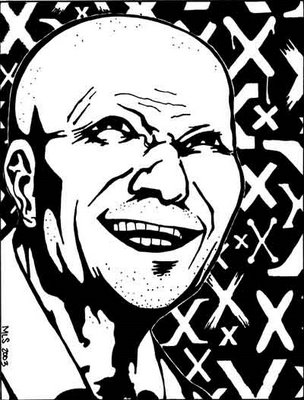 Because you asked us to we are going to cover afew more serial killers just as we did a few months back. First on our list of maggots is a Russian killer of at least 52…
Because you asked us to we are going to cover afew more serial killers just as we did a few months back. First on our list of maggots is a Russian killer of at least 52…
Andrei Romanovich Chikatilo (Андре́й Рома́нович Чикати́ло) (October 16, 1936–February 14, 1994) was a Soviet serial killer. Although at the time the Soviet government never admitted he existed. He was convicted of the murder of fifty-two women and children between 1978 and 1990.
Chikatilo was born in the Ukrainian village of Yablochnoye in 1936. His childhood was quite traumatic, particularly as the USSR was soon at war with Germany and also Stalin's plans for total and complete agricultural collectivisation caused a devastating famine. Chikatilo later heard rumours that he'd had an older brother who died in the famine and had been cannibalised by starving neighbors. Although it is not known if this story was true, there certainly were many documented cases of cannibalism during the famine. In World War II, Chikatilo witnessed some of the devastating and bloody effects of German bombing raids. Chikatilo had many fantasies of leading German captives into the woods and executing them, a fantasy that—although common of Soviet children at the time—had parallels with his murders.
Chikatilo's mother was a brutal woman. With his father at war, the young Andrei had to share a bed with his mother. He frequently wet the bed, for which he was badly beaten and humiliated. He did well at school but failed the entrance exam for Moscow State University. After finishing national service in 1960, he moved to Rodionovo-Nesvetayevsky and worked as a telephone engineer. Chikatilo's only sexual experience in adolescence by his own account was when he was 15, he leapt on a young girl and wrestled her to the ground, ejaculating as the girl struggled in his grip. It fostered in him a lifelong association between sex and violently overpowering someone.
He married in 1963, the marriage virtually arranged by Andrei's younger sister who set him up with one of her friends when she took pity on her brother's inability to obtain a girlfriend. Although he suffered from impotence, and had a barely existent sex-life, Chikatilo did father a son and daughter. In 1971, he completed a degree in Russian literature by a correspondence course and tried a career as a teacher in Novoshakhtinsk. He was a poor teacher, unable to command any respect from his pupils, but he remained in that profession, moving from school to school as complaints of indecent assaults dogged him. He eventually took a job as a clerk for a factory, and he used the many business trips around the Soviet Union to carry out his crimes.
In 1978, he moved to Shakhty and committed his first documented murder. On December 22, 1978, he lured a nine-year-old girl to an old shed and attempted to rape her. When the girl struggled, Chikatilo stabbed her to death. He ejaculated in the process of knifing the child and from then on he was only able to achieve sexual arousal and orgasm through stabbing and slashing women and children to death. Despite evidence linking Chikatilo to this first killing, a young man, Alexsandr Kravchenko, was arrested and later tried and executed for the crime. Chikatilo lost his teaching job in 1981 and became a clerk at a local firm.
He did not murder again until 1982, but in that year he killed seven times. He established a pattern of approaching runaways and young vagrants at bus or railway stations and enticing them to leave. A quick trip into a nearby forest was the scene for the victim's death. In 1983, he did not kill until June, but then he murdered four victims before September. The victims were all women and children. In the case of adult females, they were often prostitutes or homeless tramps who could be lured away with promises of alcohol or money. Chikatilo would usually attempt (consensual) intercourse with these victims, but would usually be unable to perform which would send him into a murderous fury, especially if the woman mocked his inability to achieve orgasm. This he would only do when he stabbed the victim to death. The child victims were of both genders, and Chikatilo would lure them away with his friendly, talkative manner and promising them treats, such as toys or candy. In the USSR at the time, reports of crimes like child rape and serial murder were often suppressed by the state-controlled media, as these crimes were regarded as only being common in "hedonistic capitalist nations" like the United States. Consequently, with little knowledge of the increasing body count, parents failed to warn their children to be wary of strangers. As news of the savage killings leaked out, during the 1980s, and even though there was little official information about the details, wild rumors spread amongst the communities in Ukraine, such as the idea that foreigners were killing Soviet boys in preparation for an invasion, and even talk of werewolves.
Six bodies (out of fourteen) had been uncovered. This brought a response from the oscow police. A team headed by Major Mikhail Fetisov was sent to Rostov to direct the investigation. Fetisov centred the investigations around Shakhty and assigned a specialist forensic analyst, Victor Burakov, to head the investigation in that area. The investigation concentrated on the mentally disturbed and known sexual criminals, slowly working through all that were known and eliminating them from the inquiry. A number of young men confessed to the murders, although they were usually mentally handicapped youths who had only admitted to the crimes under prolonged and often brutal interrogation. At least one suspect hanged himself in his cell while under arrest.
When boys began to make up a majority of the later victims, a frequent (and ineffective) ploy was to round up and interrogate homosexuals, the gay community being particularly clandestine in the USSR with homosexuality being illegal at the time. The police spread their search wider and wider. Over 150,000 people were interviewed and filed before this approach was abandoned. In 1984 another fifteen murders took place. The police took to additional patrols and sited plain-clothes men at many public transport stops.
Chikatilo was identified behaving suspiciously at a Rostov bus station. He was arrested and held. It was found he was under suspicion for other crimes, which gave the investigators the legal right to hold him indefinitely. Chikatilo's dubious background was uncovered but provided insufficient evidence to convict him of the murders. He was found guilty on other matters and sentenced to one year in prison. He was freed in December 1984 after serving three months.
It was later revealed that Chikatilo had been originally ruled out as a suspect in the murders because his blood group was tested as different from semen samples left by the killer. The forensic scientists later claimed that Chikatilo must be a unique individual whose blood group showed up as different when it was taken from a blood sample than when it was taken by a semen sample. No other scientists take this theory seriously and it is generally regarded that the samples were mixed up or the tests simply botched.
Chikatilo found new work in Novocherkassk and kept a low profile. He did not kill again until August 1985, when he murdered two women in separate incidents. He is not known to have killed again until May 1987 when, on a business trip to Revda in Ukraine, he killed a young boy. He killed again in Zaporozhye in July and in Leningrad in September.
The faltering police investigation was revived in mid-1985 when Issa Kostoyev was appointed to take over the case. The known murders around Rostov were carefully re-investigated and there was another round of questioning of known sexual criminals. In December 1985, the police renewed the patrolling of railway stations around Rostov. Chikatilo followed the investigation carefully, and for over two years he kept his desires under control. The police also took the step of consulting a psychiatrist, the first such consultation in a serial killer investigation in that country.
In 1988 Chikatilo resumed his killing, generally keeping his activities far from the Rostov area. He murdered a woman in Krasny-Sulin in April and went on to kill another eight people that year, including two victims in Shakhty. Again there was a long lapse before Chikatilo resumed killing, murdering seven boys and two women between January and November of 1990.
The discovery of one of the bodies near Leskhoz station led to increased police patrols. On November 6 Chikatilo killed and mutilated Sveta Korostik. He was stopped by police returning from the woodland crime but allowed to go. But the report of the suspicious character returned Chikatilo's name to the investigation.  On November 20, 1990, after police further observed his suspicious behavior, he was arrested. Between November 30 and December 5, Chikatilo confessed to and described fifty-six murders. Three of the victims had been buried and could not be found or identified, so Chikatilo was not charged with these crimes. The number of crimes Chikatilo confessed to shocked the police, who had listed only 36 killings in their investigation. A number of victims had not been linked to others because they were murdered far from Chikatilo's other hunting grounds, while others were not linked because they were buried and not found until Chikatilo led the police to their shallow graves.
On November 20, 1990, after police further observed his suspicious behavior, he was arrested. Between November 30 and December 5, Chikatilo confessed to and described fifty-six murders. Three of the victims had been buried and could not be found or identified, so Chikatilo was not charged with these crimes. The number of crimes Chikatilo confessed to shocked the police, who had listed only 36 killings in their investigation. A number of victims had not been linked to others because they were murdered far from Chikatilo's other hunting grounds, while others were not linked because they were buried and not found until Chikatilo led the police to their shallow graves.
He went to trial on April 14, 1992. Despite his odd and disruptive behavior in court, where he was kept in a cage in the center of the courtroom, he was judged fit to stand trial. The trial ended in July and sentencing was postponed until October 15 when he was found guilty of 52 of the 53 murders and sentenced to death for each offence. Chikatilo defended himself by pointing to his childhood experiences of the notorious famine which took place in Ukraine in the 1930's.
He was executed by a shot in the back of the head on February 14, 1994. Check back again next time for more weirdness.
I'm Average Joe
 Because you asked us to we are going to cover afew more serial killers just as we did a few months back. First on our list of maggots is a Russian killer of at least 52…
Because you asked us to we are going to cover afew more serial killers just as we did a few months back. First on our list of maggots is a Russian killer of at least 52… 
 On
On 

No comments:
Post a Comment